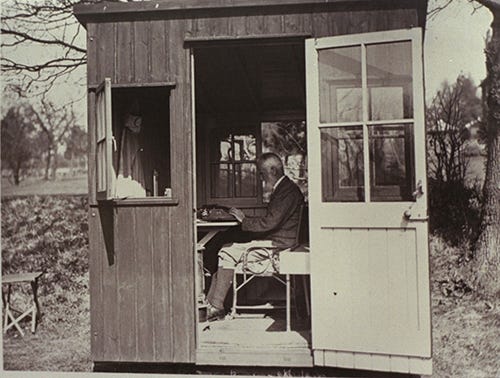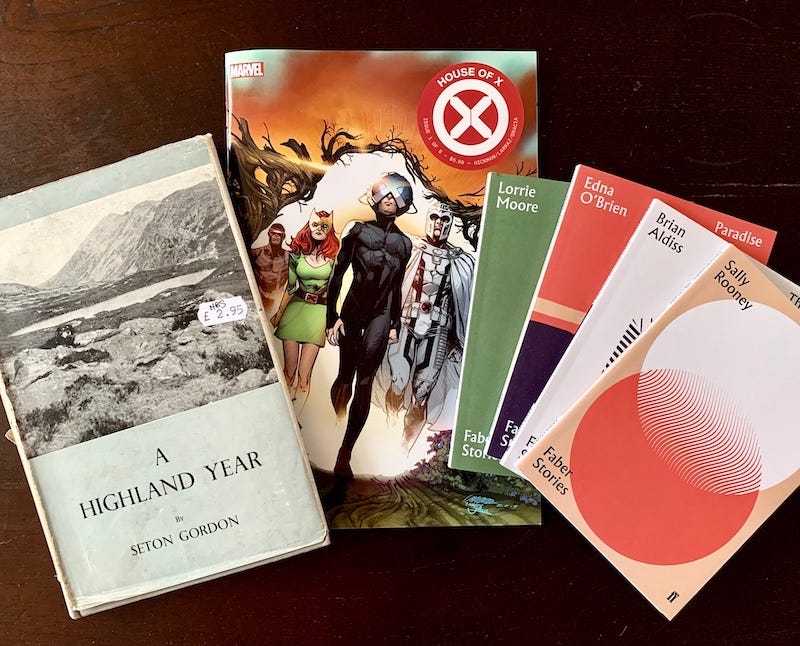⫹DESKSPACE⫺ 006: Revolving Huts & Manson Murders

Photo: George Bernard Shaw hanging out in his revolving hut, which , yes, actually revolved, because it was built on a turntable, which allowed him to always be facing the sun. Even more brilliantly, he named the hut “London” so that he could tell potential visitors that he was “in London” and remain undisturbed. Sure, he wrote Pygmalion, but this hobo shack may have been his greatest work of art. (1946)
Hello from the National Capital Region, where the summer feels like it’s already over. As I write this, I’m up at the lake, sitting on the porch, sipping a latte and listening to the Allman Brothers’ Brothers and Sisters on vinyl while the little dude naps upstairs. Which, observing myself from this external perspective, seems awfully pretentious – peak summer, peak “writer” – so this very well might be the moment from which the the pleasant torpidity of the summer declines.
⫹On My Desk⫺
I arrived home from Scotland to some good news: I’ve received a grant to work on Book #2. Logistically, this will free up some much-needed time to focus, and, spiritually, it’s a welcome third-party validation that what I’ve written so far is not terrible and perhaps maybe kind of good (or at least worth being supported by your tax dollars on). At some point soon, this project—let’s call it THE CITY, just for the sake of giving it a cool working title and making it seem like a real thing that is actually happening—will move up to the front-burner and I can experience a whole different kind of existential crisis when I sit down at my desk.
In the meantime, I’m finishing the latest (and, hopefully, final) draft of Screenplay #2, which we’ve been working on for close to two years now, and which has evolved greatly over that time, mostly for the better, but, still—two years. That’s a lot of years. Maybe too many years. So, you know, no pressure to make it any good or anything.
⫹What I’ve Been Reading⫺

A Highland Year by the Scottish naturalist Seton Gordon. I found a beautiful original printing from 1948 at the Highland Bookshop in Fort William, and have been reading it in small but fulfilling intervals since our return from the Highlands. It’s a diary, essentially, and Gordon’s meandering train of thought is beguiling: one moment he’s describing in deep psychological detail the personality of a collie he once owned; the next, he’s teaching you about the migratory habits of white wagtails and how one time he saw a mating pair lounging in his eaves three weeks after they were supposed to have left for warmer climes.
House of X #1, the first chapter of Marvel’s X-Men reboot by Jonathan Hickman, which, impossibly, lives up to (and maybe exceeds) all the hype. It’s a weird comic, filled with expository text and arcane symbols and obscure references, and the premise of the story feels sort of unprecedented (which, for a franchise that encompasses tens of thousands of individual issues, and perhaps just as many plots, is pretty remarkable). I haven’t re-read a comic book in a long time—maybe not since I was fourteen years-old—and I’ve re-read this one twice.
All These Wonderful Faber Pocketbooks, which I also picked up at the Highland Bookshop. They’re beautiful little books, both physically and conceptually. You just don’t find this kind of stuff on our side of the ocean; it’s the opposite of a Kindle single, or whatever digital publishing model is being hyped this month—proof that the UK book industry is several steps ahead of the rest of the English-speaking world.
⫹Something To Read⫺
Speed Matters: Why Working Quickly is More Important Than it Seems. A cool little essay about the value of doing things quickly (which ironically took the author more than six years to write).
“The obvious benefit to working quickly is that you’ll finish more stuff per unit time. But there’s more to it than that. If you work quickly, the cost of doing something new will seem lower in your mind. So you’ll be inclined to do more.”
⫹Something To Look At⫺
This chart pretty much sums it up:
⫹Something(s) to Listen To⫺
The latest episode of the Woodland Walks Podcast, which is all about the restoration of the Loch Arkaig Pine Forest, just north of Spean Bridge, where we stayed during our sojourn in the Western Highlands. I had lots of deep thoughts about walking culture in the UK and how differently they approach the idea of land use and accessibility, and this podcast captures a bit of the freedom that our British cousins have when it comes to meandering across their little island. Also, my sister-in-law, who works as a project manager for the Woodland Trust (and lives on an edenic little plot of land just south of the forest), makes a cameo appearance towards the end of the episode. You’ll know it’s her because you’ll understand her accent.
I saw the new Tarantino flick, and loved it, and had to remove myself (once again) from social media to avoid experiencing the weird spiritual agony of watching people joyously hate a thing you adore (for, I think, the most misguided and self-serving reasons). Anyways, I knew just enough about the Sharon Tate murders to know where it was all headed, and spent the majority of the film in an unbearable clench of dread. And then, that ending–I’ll say no more, except that whatever socio-political metaphor you want to lay on top of Tarantino’s blatantly apolitical work, you can’t deny that the ending is totally unexpected, and, for me, a bodily thrill akin to that first big gulp of oxygen you swallow after a long and arduous swim. But, anyways, after seeing the movie I wanted to learn more about Sharon Tate and Charles Manson, so finally went back into the archives and listened to the 12-Part series Charles Manson’s Hollywood from the You Must Remember This Podcast. There are a lot of good podcasts out there, but YMRT is on another level—and this series might be one of the best things Karina Longworth has done. If there was a Nobel Prize for journalistic podcasting, this would win. If you enjoy true crime stories, the 1960s Hollywood, and historical reassessment—well, let me apologize know for the 10+ hours of your time I’ve just appropriated.
That’s all for now. Make the most of summer’s remaining weeks: listen to vinyl on the porch, take a walk in the woods, avoid the joyous haters on Twitter, re-read some comics, and do whatever you’re doing faster so that you can do more of it.





